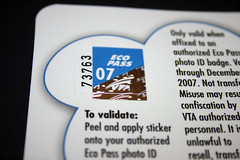Jonathan Maus passed along this important heads up: Because of fraud in the current commuter benefits program, there's concern that discussion and awareness of the program through the Bicycle Commuter Act may dissuade members of Congress from supporting the act. Jonathan asks for some discussion on how the program is administered in your area and how fraud is minimized.
I participate in my employer's Commuter Check program, which is a tax-free benefit in which I receive vouchers that are good for purchasing transit passes. As far as I can tell, there's not much oversight of this program. It would be trivially easy for me to take these vouchers -- remember, I get them for free from my employer -- and sell them for cash if I didn't use public transportation.
From what I understand, similar programs in other areas work about the same way. There are also EcoPass type systems, which is a sticker that is affixed to an employee badge. This tax-free benefit works a little better because an ID is associated with the sticker. Still, I don't think bus drivers actually look at the ID -- conceivably, I could get the EcoPass sticker and sell it before I affix it to my badge. In the Bay Area, the VTA EcoPass is worth $650 in monthly passes.
In Denver, on the other hand, the RTD EcoPass is a photo ID instead of a sticker affixed to a work badge. This is much more immune to fraud than stickers or vouchers.
What about the Bicycle Commuter Act, though? The bill provides for a tax-free cash incentive for bicycle commuters. For my commuter check participation, all I had to do was click a button on a web page affirming that I would use the voucher to buy a transit pass. Where there's government money, though, there's fraud. What can employer benefits coordinators do to minimize fraud in the bike commuter benefits program?
Thursday, April 26, 2007
Subscribe to:
Post Comments (Atom)


I don't think these programs are very effective at their intended goal, which is to have fewer people drive to work and more people do something else.
ReplyDeleteI think most people make this decision based on time rather than monetary cost, since it may take them 15min to drive or an hour by bike or bus. I think the reimbursement is so small relative to many salaries and the cost of owning an operating a car that it isn't a factor that's really considered except at the thin margin.
My company pays about $250 per month for each parking space near our building. I think it would be more fair to just say, you can either have a parking spot or $250 cash, it doesn't matter, because we'd be paying the same amount per employee anyway. We don't care if you walk, bike, bus, carpool, or whatever. If two employees want to share a spot and split the cash, that's fine too. There wouldn't need to be as much oversight, since it doesn't matter what you actually do with the benefit.
Yep. "Fraud" is just a way for the geniuses to tell the government where to shove their feely-good programs gone WILD.
ReplyDelete